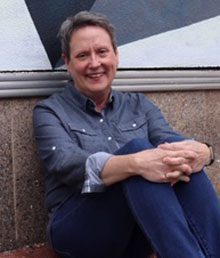I woke up this morning from a nightmarish vision of a man whose unshaven face was frozen in an expression much like the character in Edvard Munch’s The Scream. In my dream, the man could not speak. Instead, his dark, wide eyes stared directly into mine and I realized that the only way I could communicate with this living sculpture was through sight. It would be a very lonely and one-sided conversation.
 Google the famed masterpiece to refresh your memory of The Scream or to view the artwork for the first time. The person in the tempera portrait has become the icon of existential angst, simply put, existing in a state of anxiety. For the first time, I looked at the picture differently. In the portrait, the caricature has its hands raised to its face, maybe in surprise, maybe in disbelief, maybe in fear. For the purpose of this essay, I chose to interpret the portrayed expression as one of a person who does not want to hear.
Google the famed masterpiece to refresh your memory of The Scream or to view the artwork for the first time. The person in the tempera portrait has become the icon of existential angst, simply put, existing in a state of anxiety. For the first time, I looked at the picture differently. In the portrait, the caricature has its hands raised to its face, maybe in surprise, maybe in disbelief, maybe in fear. For the purpose of this essay, I chose to interpret the portrayed expression as one of a person who does not want to hear.
When I began this column a few days ago, I was focused on the concept of listening. I had noticed in my own life that people weren’t hearing what I was saying nor was I successfully communicating my thoughts. I made a few notes. “People are not saying what they mean.” “People are not giving me a chance to speak.” “People are not listening but want to be listened to.” And then the notes changed. I wrote, “Words from eyes. Screamed words.” And then my nightmare.
I Googled the word “listening”. A virtual page from The University of Minnesota’s Student Handbook popped up detailing seven key points that differentiate the active skill of listening versus hearing. According to UM, “listening includes eye contact, a focus on content not delivery, avoiding emotional involvement and surrounding distractions. Listening is active not passive. You become more involved in the exchange if you ask questions. Finally, there is a gap between the rate of speech and the rate of thought providing an opportunity for the mind to wander.” These key points are focused on the matriculating student body as they begin participating in their first lectures but the wisdom is true for all.
I’m not certain if I am a good listener. I try but I am probably selective in what I hear and what I want to hear. Because I settled into a sales career, I learned early on that listening is a skill and one that takes practice. There is so much noise around us and there is a difference between noise and sound. The noise in our lives, both internal and external, makes it hard to really listen.
For the last five years of my adult life, I have clung to the idea of a “still, small voice” and wondered if it was floating on a breeze in its search to find my ears. Recently, as I stood beside my father’s grave, I closed my eyes just to listen. I heard robins singing, jets pass by overhead and automobile traffic whir off in the distance. For just a moment, I thought I heard a breath exhaled and turned to see if a deer was close by. Sometimes we imagine what we want to hear.
I want to be an engaged and interested listener. I don’t want to cover my ears, screaming, blocking out the reality that surrounds me. At the same time, I want to be heard, but it is incumbent upon me to effectively communicate so that I can be understood.
As I dug deeper into the topics Google presented to me on listening, I learned about the International Listening Association that promotes the study, development and techniques for good listening. Inside their homepage are quotations on the subject. Here’s one from Allison Para Bastien:
Listening is noting what, when and how something is being said. Listening is distinguishing what is not being said from what is silence. Listening is not acting like you’re in a hurry, even if you are. Listening is eye contact, a hand placed gently upon an arm. Sometimes, listening is taking careful notes in the person’s own words. Listening involves suspension of judgment.
Somewhere in my nightmare dream was a person whose piercing stare was screaming to be heard. Maybe the voiceless man was the people in my life. Maybe it was just me.
Hearing the Stuff of Dreams





